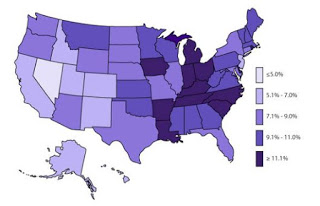Study finds ADHD meds may help decrease risky behavior, but says more research is needed; ADHD is most common in Ky.

“Treatment with ADHD medication made children less likely to suffer consequences of risky behaviors such as sexually transmitted diseases, substance abuse during their teen years and injuries,” says a Princeton University news release abotu a study in South Carolina.
“ADHD is such a major issue, but no one seemed to be able to give a very definite answer to the long-term effect of the medication,” researcher Anna Chorniy said in the release. “For our sample population, we were able to see everyone who had an ADHD diagnosis and track their health over time to identify any potential benefits of the medication or the lack of thereof.”
The study looked at Medicaid claims for nearly 150,000 children diagnosed with ADHD in South Carolina between 2003 and 2013.
 |
| Percent of Youth Aged 4-17 with ADHD by State: National Survey of Children’s Health |
The latest data from the U.S. Centers for Disease Control and Prevention show Kentucky leads the nation in the percentage of children ages 4-17 with ADHD at 15 percent; the national percentage is 11 percent. Almost 70 percent of children who are diagnosed with ADHD are treated with medications.
ADHD is a behavioral condition characterized by difficulty focusing, acting without thinking, and hyperactivity. Children with ADHD are known to be at higher risk for risky behaviors such as dangerous driving, drug use and risky sexual behavior.
The study, published in the journal Labour Economics, compared ADHD-medicated children to those who were diagnosed with ADHD, but not on medication. Those who took medication were 3.6 percent less likely to contract a sexually transmitted disease, 7.3 percent less likely to have a substance-abuse disorder and 2.3 percent less likely to be injured.